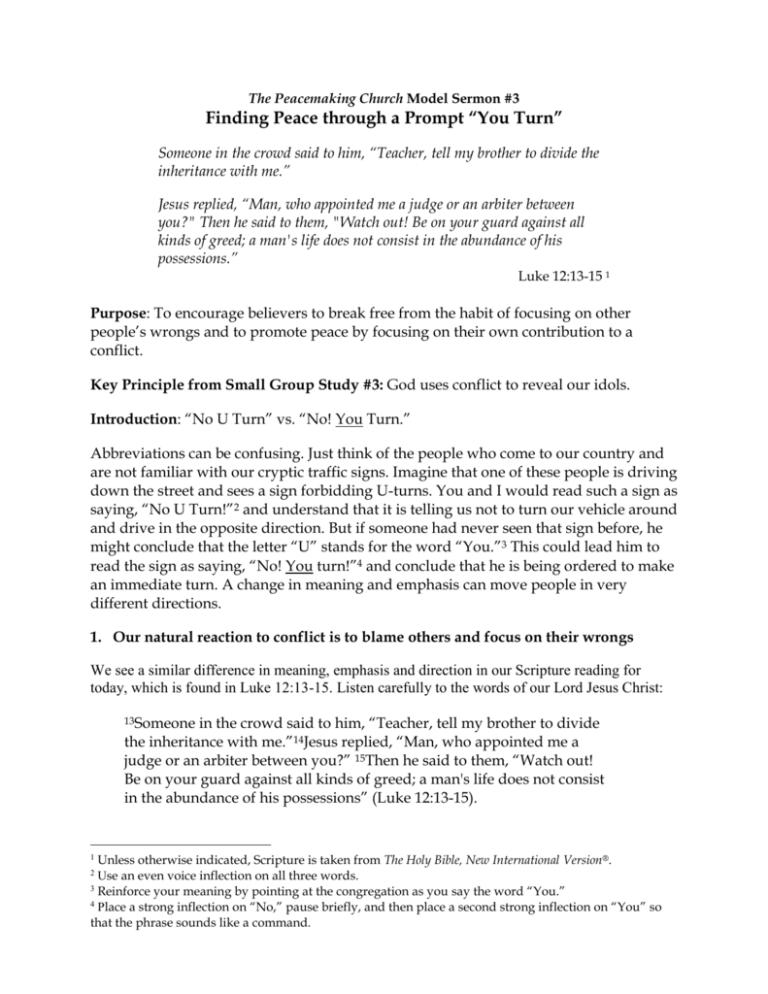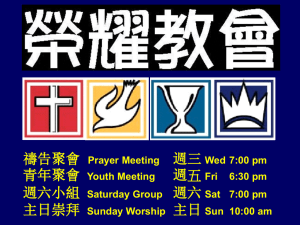Sermon 3 – Finding Peace
advertisement

The Peacemaking Church Model Sermon #3 Finding Peace through a Prompt “You Turn” Someone in the crowd said to him, “Teacher, tell my brother to divide the inheritance with me.” Jesus replied, “Man, who appointed me a judge or an arbiter between you?" Then he said to them, "Watch out! Be on your guard against all kinds of greed; a man's life does not consist in the abundance of his possessions.” Luke 12:13-15 1 Purpose: To encourage believers to break free from the habit of focusing on other people’s wrongs and to promote peace by focusing on their own contribution to a conflict. Key Principle from Small Group Study #3: God uses conflict to reveal our idols. Introduction: “No U Turn” vs. “No! You Turn.” Abbreviations can be confusing. Just think of the people who come to our country and are not familiar with our cryptic traffic signs. Imagine that one of these people is driving down the street and sees a sign forbidding U-turns. You and I would read such a sign as saying, “No U Turn!”2 and understand that it is telling us not to turn our vehicle around and drive in the opposite direction. But if someone had never seen that sign before, he might conclude that the letter “U” stands for the word “You.”3 This could lead him to read the sign as saying, “No! You turn!”4 and conclude that he is being ordered to make an immediate turn. A change in meaning and emphasis can move people in very different directions. 1. Our natural reaction to conflict is to blame others and focus on their wrongs We see a similar difference in meaning, emphasis and direction in our Scripture reading for today, which is found in Luke 12:13-15. Listen carefully to the words of our Lord Jesus Christ: 13Someone in the crowd said to him, “Teacher, tell my brother to divide the inheritance with me.”14Jesus replied, “Man, who appointed me a judge or an arbiter between you?” 15Then he said to them, “Watch out! Be on your guard against all kinds of greed; a man's life does not consist in the abundance of his possessions” (Luke 12:13-15). Unless otherwise indicated, Scripture is taken from The Holy Bible, New International Version®. Use an even voice inflection on all three words. 3 Reinforce your meaning by pointing at the congregation as you say the word “You.” 4 Place a strong inflection on “No,” pause briefly, and then place a second strong inflection on “You” so that the phrase sounds like a command. 1 2 Imagine how this man spoke when he approached our Lord. Where were his thoughts focused? Where did he place the emphasis in his demand for justice? It is altogether likely that he said, “Teacher, tell MY BROTHER to divide the inheritance with me” (add emphasis). Our sinful nature gives us an inclination to judge others critically rather than charitably. As a result, whenever we experience conflict, our natural reaction is to blame5 others and focus on their wrongs. This tendency is as old as the world. When God confronts Adam in Genesis 3, Adam is quick to shift the focus to Eve’s conduct. Eve is equally swift to blame Satan for the sin that has brought cascading conflict into the world. In Genesis 37, we see how Joseph’s brothers fanned sibling jealousy into a murderous plot by focusing endlessly on the ways their younger brother offended them. The account in 1 Samuel 18 and 19 shows how King Saul was obsessed with David’s conduct and repeatedly blamed him for their estrangement. This pervasive tendency to blame others for conflict is so natural that we do not need to teach it to our children. As soon as they can mouth the simplest words, they begin to use their tongues to shift the focus from their own wrongs to the actions of others: “He took my toy!” “She hit me first!” “He does it, too!” As we get older, we try not to be quite so obvious when we blame others for our problems, but the natural tendency is still there. If we are in a conflict, we ignore or pass quickly over our own deficiencies while developing detailed lists of what others have done wrong. [Emphasize this point by including a personal example. For example: When Corlette and I had an ongoing disagreement, we decided to go to our pastor for advice. During our meeting with him, I took the initiative by laying out the problem as I saw it. I started by describing my wrongs in the situation, and then I listed Corlette’s. My pastor smiled and said, “Ken, if you could describe your wrongs with the same level of detail and passion that you gave to Corlette’s behavior, you wouldn’t need to be in my office today.” Ouch! He was absolutely right; I had given only brief lip service to confessing my contribution to the problem, but I had critiqued Corlette’s behavior with a microscope and a fine tooth comb.] [You could also include a relevant illustration from local or national news. Simply peruse a newspaper or news magazine, and you should be able to find a current controversy where both sides are blaming others and refusing to admit any wrongdoing themselves.] 5 Bold, underlined words are the key words that fill in the blanks in the provided bulletin inserts. 2 The inclination to blame others for a problem and focus on their behavior is deeply engrained in our culture. Soap operas and political campaigns gain their most avid audiences when the players are lobbing passionate accusations at one another. And when we engage in courtroom battles, we are willing to pay large fees to have our attorneys minimize our wrongs and focus the jury’s attention on our opponent’s deficiencies. 2. The blame game always makes conflict worse Blaming others for a conflict can do something far worse than generating a big legal bill. Look back at our text and notice how Jesus responds to the man’s focus on his brother’s behavior. Jesus says, “Watch out!” Our Lord gives an emphatic warning that there is great danger ahead when we focus on other’s wrongs and ignore our own contribution to a conflict. Jesus knew that the blame game always makes conflict worse. It takes our eyes off our own contribution to a conflict and blinds us to the steps we can take to promote reconciliation. Worse yet, dwelling on an opponent’s behavior can escalate and expand a conflict by attracting the attention of other people and tempting them to take up sides. This dynamic divides countless families, churches, ministries, companies, and communities every year. [If appropriate, refer to a recent conflict in your community that grew out of proportion because of blame-shifting.] Blaming others also causes us to look for and exaggerate others’ wrongs, while ignoring their virtues. This critical perspective inevitably aggravates resentment, judgmental attitudes, and anger. As these feelings grow in our hearts, we can become consumed and controlled by bitterness toward others. As Psalm 73:21-22 warns, “When my heart was grieved and my spirit embittered, I was senseless and ignorant; I was a brute beast before you.” No wonder Jesus says, “Watch out!” 3. You can change the course of a conflict with a prompt “You-turn” But thank God that Jesus’ warning does not end with the words, “Watch out.” He graciously goes on to say, “Be on your guard against all kinds of greed; a man's life does not consist in the abundance of his possessions.” With this brief warning, Jesus is teaching us that we can usually change the course of a conflict with a prompt “you-turn.” That’s spelled, y-o-u … t-u-r-n. Our Lord knows that driving straight ahead and emphasizing others’ wrongs always makes conflict worse. Therefore, he commands us to turn around and look at ourselves. He essentially says, “No! Stop blaming others for this conflict. YOU should be the first one to TURN around and look for the ways that YOU have contributed to this problem. TURN aside from blaming and take the road of repentance and confession. That is the way to peace and reconciliation!” 3 Jesus gives a similar exhortation in a passage we looked at last week. In Matthew 7:3-5, he says: “Why do you look at the speck of sawdust in your brother's eye and pay no attention to the plank in your own eye? 4 How can you say to your brother, ‘Let me take the speck out of your eye,’ when all the time there is a plank in your own eye? 5 You hypocrite, first take the plank out of your own eye, and then you will see clearly to remove the speck from your brother's eye.” In his great love for us, Jesus is showing us the way that we can turn conflicts around. Instead of indulging our habit of putting the emphasis on others’ wrongs (and sticking them in the eye with our sharp accusations!), he teaches us that the shortest route to peace and reconciliation is to take a careful look in the mirror so we can identify and confess the “planks” in our own eyes. Then and only then will we be in a position to graciously and effectively help others to see how they too have contributed to a conflict and can help to resolve it. 4. Genuine reconciliation and lasting change require a transformed heart Confessing wrong words and behavior will usually change the course of a conflict. A simple confession will often break the cycle of blaming and subdue intense emotions. Sometimes it will also encourage others to reflect on their own conduct, which may eventually lead them to admit their wrongs. If we want real peace, however, we must go beyond confessing sinful behavior. Genuine reconciliation and lasting change require a transformed heart. Look again at Luke 12:15: “Be on your guard against all kinds of greed; a man's life does not consist in the abundance of his possessions” (emphasis added). Jesus is teaching us to go beyond surface behaviors and get to the root cause of our problems, which is usually a worldly desire that has taken control of our hearts and is compelling us to say and do sinful things. Jesus offers a similar warning in Matthew 15:18-19, where he said, “But the things that come out of the mouth come from the heart, and these make a man ‘unclean.’ For out of the heart come evil thoughts, murder, adultery, sexual immorality, theft, false testimony, slander.” This truth is echoed and applied specifically to conflict in James 4:1-3, which says: What causes fights and quarrels among you? Don't they come from your desires that battle within you? 2 You want something but don't get it. You kill and covet, but you cannot have what you want. You quarrel and fight. 4 You do not have, because you do not ask God. 3 When you ask, you do not receive, because you ask with wrong motives, that you may spend what you get on your pleasures. Through these passages, God is teaching us that the key to experiencing genuine peace and reconciliation is to recognize, confess, and get rid of the sinful desires that rule our hearts. We cannot do this on our own. No matter how much we hate our pride, selfrighteousness, envy, jealousy, and unforgiveness, we cannot sweep these things from our hearts through our own efforts. But God can. He sent his own precious Son to the cross to pay the full penalty for the many sins that we have committed against him and one another. Through faith in Christ, we can experience complete forgiveness and reconciliation with God. As we read in Colossians 1:19-20 a few weeks ago, “God was pleased to have all his fullness dwell in him, and through him to reconcile to himself all things, whether things on earth or things in heaven, by making peace through his blood, shed on the cross.” When God forgives and redeems us, he also gives us a new heart. In Ezekiel 36:25-27, he makes this wonderful promise: I will sprinkle clean water on you, and you will be clean; I will cleanse you from all your impurities and from all your idols. I will give you a new heart and put a new spirit in you; I will remove from you your heart of stone and give you a heart of flesh. And I will put my Spirit in you and move you to follow my decrees and be careful to keep my laws. The transformation of our hearts is both an event and a process. When God saves us, he gives us a new heart that enables us to repent from our sins and trust in Jesus as our Savior. That event triggers a life-long process in which the Holy Spirit slowly and steadily transforms our hearts and minds so that we progressively put off our old desires and behaviors, and replace them with desires and behaviors that are pleasing to God (see Rom. 12:1-2; Eph. 4:22-24). As the passages above indicate, God often uses conflict to move us along in this transformation process. Every time we are in a conflict, we have the opportunity to identify worldly desires that have taken control of our hearts, turned our eyes away from God, and caused us to do and say things that offend other people. As these sinful desires are exposed, we can confess them to God, seek his forgiveness, and ask him to help us find contentment and security in him alone. As God purifies and liberates our hearts, we can also confess our sinful desires to one another. Instead of staying on the surface and talking only about our behavior, we can demonstrate the reality of God’s transforming work in our hearts by admitting to the desires that have been ruling our hearts, such as greed, control, envy, and selfishness. 5 These humble and transparent confessions are far more likely to touch the heart of someone we’ve offended and move them to forgive us and also take a deeper look at themselves. When both sides in a conflict dig deep into their own hearts and confess both the attitudes and the actions that have offended others, peace and reconciliation are just around the corner. Conclusion The natural human response to conflict is either to run away from the situation or drive straight ahead and blame others for the problem. Jesus has opened the way for us to take a different and far better path. By his grace, we can make a humble “you-turn” by facing up to the sinful desires in our hearts and confessing the logs in our eyes. This radically different approach to conflict will bring honor to our Lord, set us free from the blame game, and place our feet on the path to peace, reconciliation, and lasting change. Challenge: Making a “you-turn” means that you are going to go in another direction. Lay out a practical plan for the route that you will take, with God’s help, as you go in this new direction. 6









